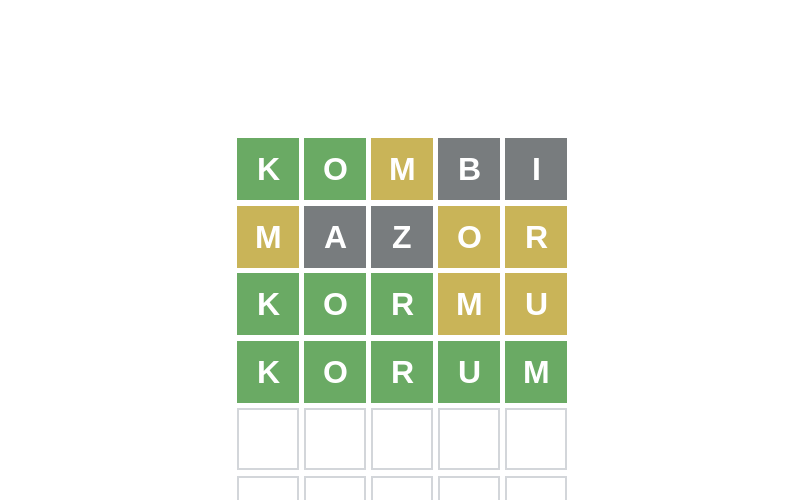
Boston Based techpreneur, Alden do Rosario, elaborates on creating Uttor, the Konkani version of the hit, daily game: Wordle
Born and brought up in Goa, Alden do Rosario is a computer scientist turned entrepreneur, and is now settled in Boston. Growing up, he loved two things, math and sports. At one time he had a chance to play table tennis professionally, but like most Indian kids, fell back to becoming an engineer. 
As luck would have it, he chose Computer Science, which was a growing field at that time. After graduating from VNIT Nagpur, Alden worked in India for two years before moving to the US. In his initial years in the US, he worked as a senior research engineer and in parallel completed his MS in Computer Science from the University of Massachusetts, Amherst. Alden now lives in Holliston, Massachusetts with his wife Michelle and 4 kids.
Alden speaks on his entrepreneurial journey. “The roots of my entrepreneurial journey were sown after the 2003 Internet bubble burst. While I had no intention of starting a business, my partner Dr. Venkat Kolluri convinced me that in America, we needed to OWN — rather than work for someone else. That got us thinking and after borrowing $7 from our wives, we started Chitika. It took us 18 months to make our first $1, but after that, we managed to launch our first product in the contextual advertising space which was dominated by Google Adsense. Over the years, with zero dollars of additional funding, we bootstrapped our way to become №2 behind Google Adsense in the contextual advertising space.”
Recently, in collaboration with his daughter, Anna do Rosario, Alden co-founded Poll the People, a software service that offers micro-surveys for making data-backed decisions for various business dilemmas.
Alden is also the creative genius behind UTTOR, the Konkani version of Wordle, the minimalist online game taking the world by storm, which has gone viral, with many Goans playing the English version game daily and displaying their results on social media.
A few months ago, Josh Wardle, a Brooklyn, NY-based software engineer, created the game and made it available to the public. Wardle initially designed the word-guessing puzzle as a gift for his partner, but after it proved popular with family and friends, he placed it on a simple public website.
Since then, the game has attracted millions of fans and become a household name. Its emoji-based result reports — stacks of colored squares representing how many attempts it took to guess the five-letter word — have flooded our social media feeds.
Having translated the game, Alden has made it available for free on the website: uttor.org
Wordle has captured our imagination with many Goans playing the game daily and waking up to this refreshing mental exercise.
Why is everyone crazy over Wordle?
The game’s success has been attributed to its simplicity: it asks you to guess a five-letter word, and gives you six tries, showing you whether any of your chosen letters are in the secret word and whether they are placed in the right position.
Some have also praised the game for being a once-a-day affair, meaning it only takes a few minutes of your time and does not send you annoying reminders, show you ads, or invite you to compete with other players (though it does show you your personal track record).
On February 1, the game’s fans woke up to the news that The New York Times was buying Wordle for “an undisclosed seven-figure sum.” Wardle himself shared an emotional post on Twitter, saying he was “thrilled” about the deal and adding that the game “has gotten bigger than I ever imagined”
“It has been incredible to watch the game bring so much joy to so many and I feel so grateful for the personal stories some of you have shared with me – from Wordle uniting distant family members, to provoking friendly rivalries, to supporting medical recoveries”, he said.
And now with the game becoming available in Konkani, many Goans are finding it creatively refreshing to wake up to a Konkani game. This is increasingly true for the Goan diaspora who need to brush up on their Konkani.
“I think Goans kind of appreciate that Wordle is now available in Konkani”, says Alden. “It’s not trying to do anything shady or make money with ads. It’s just a game that’s fun and made freely available for the Goan public.”
Who created the Konkani Wordle?
The original English version was created by Josh Wardle, a software engineer in Brooklyn, who knew his partner loved word games, so he created a guessing game for just the two of them. As a play on his last name, he named it Wordle.
The Konkani version was created by Alden. On a cold Boston Sunday morning, Alden woke up and realized that the family had been snowed in thanks to a big snowstorm. Having been obsessed with the English version, he asked himself the question “Why don’t we have this in our native language of Konkani?”. Konkani is a native Indian language that is widely spoken in the State of Goa.
“The biggest challenge in porting the game over to Konkani was the availability of a good Konkani dictionary. I had to search far and wide on the Internet to find a good Konkani dictionary”, said Alden.
After testing out the game with a few friends and family, and making some much-needed enhancements, Alden made the game available on uttor.org
Where can you play Konkani Wordle?
You can play Konkani Wordle on the web at https://uttor.org/
And while there is no official mobile app for Konkani Wordle, you can easily play the game in a web browser on your Android, iPhone, or iPad. 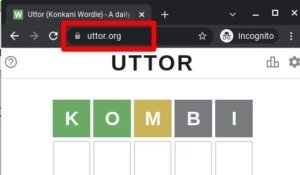
There is only one Konkani Wordle puzzle per day. If you don’t guess the word of the day, you’ll have to wait until tomorrow to guess a new 5-letter word.
How to play Konkani Wordle?
1. Enter a 5-letter Konkani word.
You’ll have 6 chances to guess the 5-letter Konkani word of the day, so make every guess count! Try using a word that contains many different letters to narrow down your future guesses. Type your first guess, and then press or click Enter to see if you’ve matched any letters. 
2. Check the tile colors. 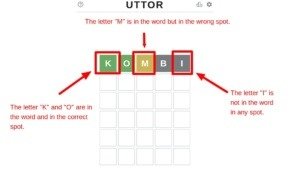
After you make a guess, the tile colors will change:
- A green tile indicates that you’ve guessed the correct letter in the correct place in the word.
- A yellow tile means you’ve guessed a letter that’s in the word, but not in the right spot.
- A gray tile means that letter is not in today’s word.
3. Guess another Konkani word.
Use the clues you got from your first guess to try again. Remember, don’t reuse any of the gray letters, as they are definitely not in today’s Konkani Wordle.
If you correctly guessed a letter at the correct position (a green tile), make sure to use that letter at that position in your second guess.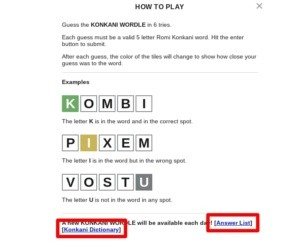
Letters can appear more than once in the same word.
If you are getting stuck and out of guesses, there is a helpful dictionary in the “Help” section. Just hit the “?” in the top left section and there is a link to a Konkani dictionary for ideas.
4. Continue entering your guesses until all letters are green.
When you’ve correctly guessed the word, you’ll see a pop-up window with your statistics, as well as a countdown timer that tells you how long it’ll be until the next Konkani Wordle is available.
If you are desperate (as some tend to get), you can find the list of possible answers in the “Help” section. Just hit the “?” in the top left section and there is a link to the list of possible answers. Your find word will only be from within this list. 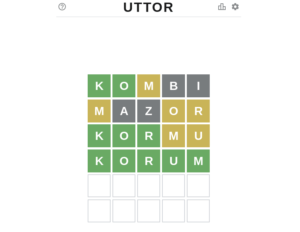
5. Share your score.
If you want to show others how you did, click the Share button to copy a colorful grid that you can paste into WhatsApp, Facebook post, email, or instant message.
Since everybody is playing the same Konkani Wordle puzzle, your results won’t divulge the word of the day to your friends and followers. 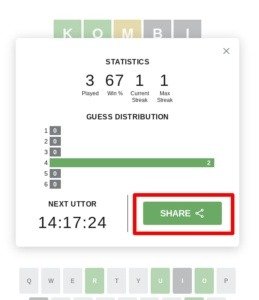
You can return to your statistics (and the Share button) at any time by clicking the bar graph icon at the top of Konkani Wordle.
Tips and tricks
1. For your first guess, pick a Konkani word that contains at least three vowels.
The goal of your starting word is to narrow down the options for the remaining guesses. Using three vowels is a great way to narrow down the options for subsequent words. Try any of these multi-vowel words for a top-notch first guess:
- AILEM
- ADEUS
- AVOIS
- FAIDO
- ZAITO
2. Consider possible words based on the results of your first guess.
If you’ve selected a good first word, you should have some yellow and/or green tiles to work with. Think of some 5-letter words that contain those letters, but that don’t contain any of the gray (incorrect) guesses.
3. Pay attention to the positions of yellow tiles.
A yellow tile means that letter is in the Konkani Wordle of the day, but not at the position you’ve guessed. Consider the most common locations of the yellow letters in 5-letter words you know. For example, if you have a yellow K in the second position of your first guess, you might try placing it in the 5th position instead—many 5-letter words end with “IK” (e.g. BARIK, FARIK, TARIK)
4. Don’t reuse gray tiles.
If you’ve already tried a letter that isn’t in today’s Konkani Wordle, remember not to include it in your second or subsequent guesses.
Since everybody is playing the same Konkani Wordle puzzle, your results won’t divulge the word of the day to your friends and followers.
You can return to your statistics (and the Share button) at any time by clicking the bar graph icon at the top of Konkani Wordle.
Who can you play with?
The game itself you play by yourself. You don’t need anyone else to play with you. But when you do crack the Konkani word of the day, you will want to share your success with others. You can do this by hitting the “Share” button at the end of the game. There are now two great ways to play along and share your success with others:
- Whatsapp: Join the “Konkani Wordle Lovers” Whatsapp group and share today’s wordle there. Remember: It is bad manners to share today’s word or to give ideas.
Facebook Group: Join the “Konkani Wordle” Facebook group. Just search on Facebook for “Konkani Wordle”
What are the benefits of playing Konkani Wordle?
Konkani Wordle is a great way to improve your Konkani vocabulary and spelling skills. The game involves creating Konkani words out of a selection of letters. This is a great way to improve your Konkani vocabulary because you are forced to remember and use Konkani words that you may not normally use.
It’s also a great way to improve your concentration and focus. Similar to meditation or yoga, a lot of Konkani Wordle lovers like to play it in the morning. It helps to relax and improve focus.
For the Goan diaspora that is getting rusty with their native language, this is a great way to stay in touch with Konkani and maintain the Goan culture.
Is this game good for kids?
The Konkani Wordle is a great way for kids to learn the Konkani language in a fun, easy environment. Rather than memorizing words, it helps to learn a language in a fun environment. This means kids can play as well with great success while using their brains to think of words.
The Konkani Wordle was not designed to stump players in the same way a difficult word game would. It was created to give people a little fun each day, only for a few minutes.
You can’t overplay the game. As mentioned, you can only play once a day.
Another thing that makes the game unique is that everyone playing throughout the world is trying to figure out the same Konkani word. It’s also an excellent way to reduce stress by playing a simple game.
For Goan diaspora around the world, the younger kids are having trouble staying in touch with their native language. Kids might speak a little Konkani at home but are not exposed to a wide vocabulary of words. This game helps to engage the kids in their native language.
Konkani Wordle in the classroom at school?
Teachers in school are always looking for ways to captivate the attention of kids in the classroom. The rule for cell phones in school is usually for students to put them away during class. But what fun it would be if kids could use their phones to play the game together. Students may already be using a tablet, in which case you could play from there.
The idea is to have everyone in the classroom play the game without sharing their progress with others. Some kids will discover the word earlier than others. The teacher can be available to assist individual students throughout the class as they play. Students who complete the game can show their teacher they solved the word and put down their phone or tablet until everyone is done with the game.
Playful revival of the Konkani language worldwide
The Wordle game’s popularity has also created new opportunities to promote indigenous languages. Besides Konkani, the game has been translated into hundreds of different languages. It’s an added honor that Konkani was the first Indian language to which the game was translated.
In a world where our daily existence is oversaturated with words and with so many sources of information vying for our attention, it’s sometimes nice to exhale, set aside your social media feeds, and spend five minutes meditating on a single Konkani word — doubly so if that word is in your native language – Konkani
When asked whether he would develop more such games so as to encourage Goans to speak Konkani, Alden says, “One thing I might do is, create some features which will help kids play the game. Like a “Hint” system. I want to see the educational benefit of stimulating games like this. These not only relieve stress, but also create connections in the brain when kids and adults play such games. I benefitted tremendously by playing Scrabble when I was a kid – and those ‘mental connections’ help exercise the brain.”





